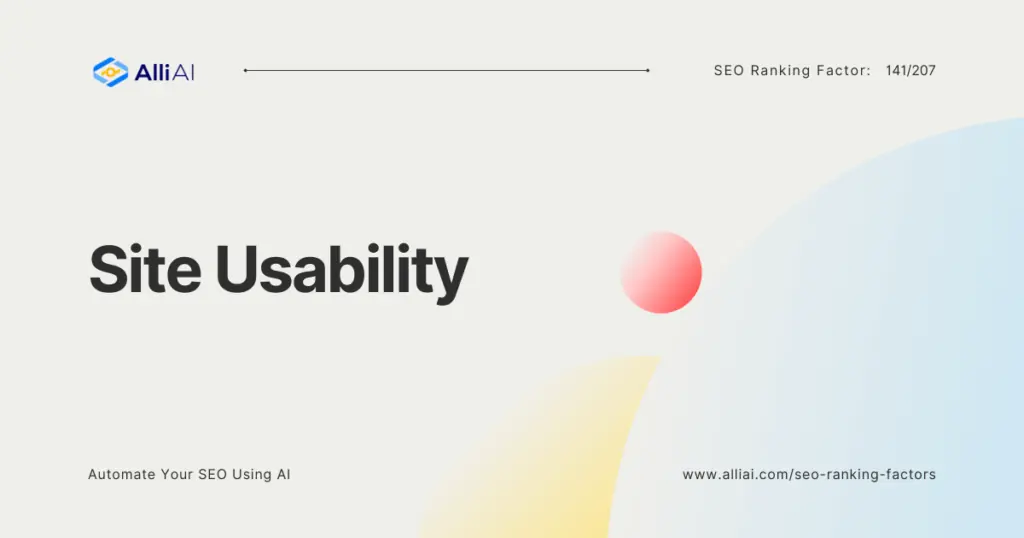Site Usability: Definition and Explanation
Site usability, in the digital realm, entails how easy it is for users to interact with a website. This encompasses a broad range of website design aspects, including simplicity, loading speed, intuitive navigation, mobile-friendliness, and the overall ease of finding information or completing actions (like making a purchase or signing up for newsletters).
To draw a real-life analogy, think of site usability like entering a well-organized, clean, and welcoming retail store. Everything you need is clearly marked, the aisles are easy to navigate, items are within easy reach, and you can quickly find help whenever you need it. A website with high usability provides a similarly seamless and enjoyable experience, encouraging visitors to stay longer, explore more, and ideally, take the desired actions.
Why is Site Usability Important in SEO?
Site usability has increasingly become a cornerstone of search engine optimization (SEO) strategy. This importance stems from Google’s commitment to prioritizing user experience. Since Google’s primary goal is to return the most useful and relevant search results, it favors websites that offer a beneficial, user-centered experience. Websites that excel in usability not only rank higher in search engine results pages (SERPs) but also tend to lead to higher conversion rates.
How Site Usability Affects SEO
The impact of site usability on SEO is multifaceted. Here are several ways it plays a crucial role, accompanied by relevant statistics:
1. Page Load Time: A Google study found that as page load time goes from one to ten seconds, the probability of a mobile user bouncing increases by 123%. Hence, faster loading times, a usability factor, directly contribute to lower bounce rates and higher rankings.
2. Mobile-Friendliness: With over 50% of worldwide web traffic coming from mobile devices, Google uses mobile-friendliness as a ranking signal. A mobile-optimized site is not just a recommendation; it’s essential for ranking and user satisfaction.
3. Bounce Rate and Time on Site: Websites with straightforward navigation and engaging content generally have lower bounce rates and longer average time-on-site metrics. These factors indirectly influence search rankings since Google views them as indicators of a site’s value and relevance to users.
4. Accessible and Inclusive Design: Ensuring that your site is accessible to all users, including those with disabilities, enhances usability and broadens your audience. Google recognizes the importance of accessibility in providing a good user experience
FAQ
How can I improve my website’s usability?
Improving your website’s usability can be achieved by focusing on user-centered design principles. Simplify your site’s structure, speed up load times, make your site mobile-responsive, and ensure that your content is easy to read and navigate. Utilizing tools like Google’s PageSpeed Insights for speed optimization suggestions and conducting usability testing can offer valuable feedback.
Does site usability directly influence SEO rankings?
While Google has not explicitly stated that usability is a direct ranking factor, many elements of usability (such as mobile-friendliness and site speed) are known ranking signals. Moreover, the indirect effects of good usability, such as lower bounce rates and longer dwell times, can positively impact SEO rankings.
Can usability impact my site’s conversion rate?
Absolutely. A user-friendly site encourages visitors to stay longer, explore more pages, and feel more comfortable taking actions like making a purchase or signing up for a newsletter. Improving usability can lead to a better user experience, which often results in a higher conversion rate.
Conclusion
Site usability goes beyond mere aesthetics and functionality; it’s about delivering a seamless and satisfying experience to every visitor. In today’s digital landscape, where the competition for attention is fierce and the patience of users is limited, neglecting usability can be detrimental to your online visibility and success. By enhancing the usability of your website, you not only cater to your users’ needs but also strengthen your SEO efforts, thereby paving the way for better rankings, more traffic, and increased conversions. Start treating usability as a key component of your SEO strategy today, and watch as your website climbs up the ranks in SERPs, one satisfied user at a time.






